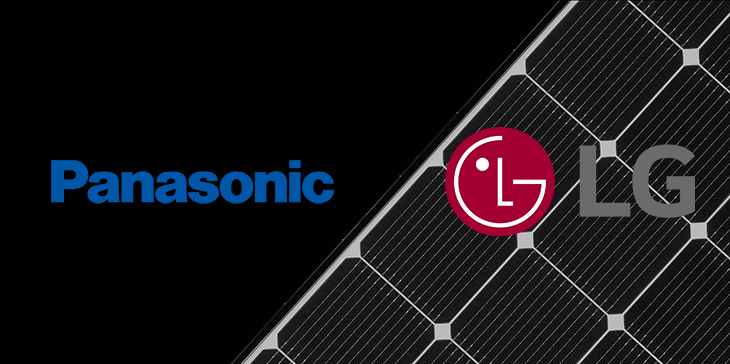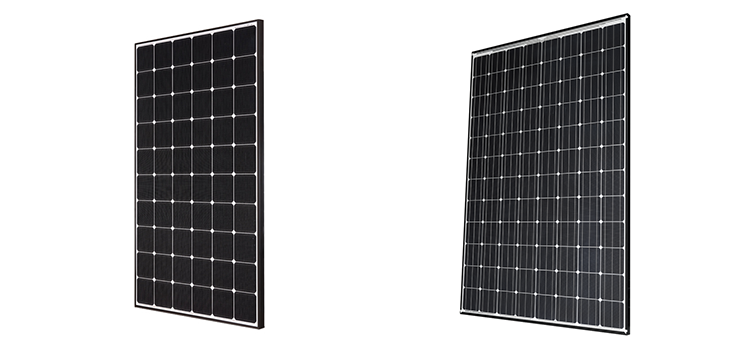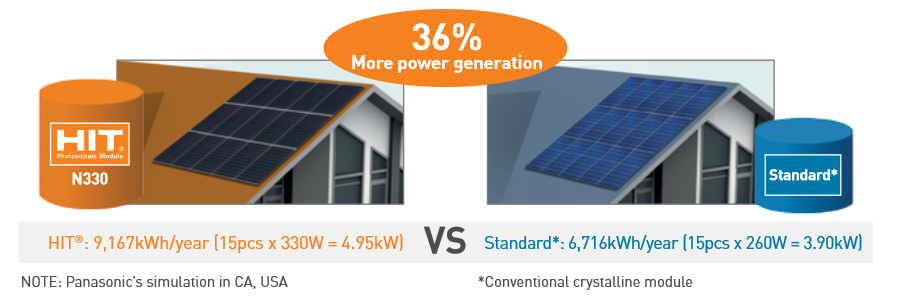 Loading... Please wait...
Loading... Please wait...Solaris Blog - Panasonic
LG Solar vs Panasonic: What’s Best?
Posted by Justin Bye on 27th Sep 2018

You know of LG and Panasonic from their electronics divisions, now both big companies are manufacturing some of the best solar panels in the industry to date. Since their induction into the solar market each company has produced and delivered us high quality, top efficiency, and very reliable solar panels that continue to push the bar for what defines and makes a “premium solar panel”.
We often get asked, “Which solar panels are better, LG or Panasonic? ” So, we went ahead and looked at two comparable modules from each company. We found that both panels are strikingly similar, with minor variations that make both manufacturers solar panels premium quality, but each a little different. It is our opinion that both modules are of incredible quality and make an intelligent investment choice for a home (or commercial) solar power system. We stand behind both solar panel manufacturers, and we can confidently say both are great choices. Let’s look now and see what’s best.
For this comparison and review, we will be taking two modules from each manufacturer.
LG: LG NeON2 LG330N1C-A5 330w Mono Solar Panel
Panasonic: Panasonic VBHN330SA17 330w Mono Solar Panel
Leading Warranties
Both solar panels manufacturers come with leading warranties, a double 25-year warranty from LG (for product and power output), and a similar 25-year product with a 25-year output warranty from Panasonic. As such, both companies stand behind their products over the long-term and will repair or replace their modules with leading warranties.
Clearly, a solid warranty from a reputable company will tell us what we can at a minimum expect from the longevity of each module and the performance over time – read more about “How long do solar panels last?”
See here: LG warranty (25 years) and Panasonic warranty (25 years)
Winner: Tie
Superior Design
LG and Panasonic also design aesthetically superior mono solar panels that come in all black design or black cells with a silver frame for any style homeowners want to have for their system. Module sizes do vary from each company – we normally carry 96-cell modules from Panasonic, and 60-cell modules from LG.
Both module manufacturers design aesthetically superior solar panels for home solar power systems and can be integrated into a wide variety of applications that meet design demands for the majority of homeowners and installers.

*LG Neon 2 left, Panasonic HIT right
Winner: Tie
Top-Rated Efficiency
Efficiency is the name of the game when it comes to the quality of each company’s research and development departments. While both brands attempt to define innovative power intake rates, they both come equipped with high-efficiency cells, and coincidently similar total module efficiency rates.
Both companies have developed high-efficiency solar cells and continue to be leading the industry in module efficiency. Panasonic has been known to have among the highest out of all other solar panel brands.
LG Neon 2 330w module efficiency: 19.3%
Panasonic HIT 330w module efficiency: 19.7%
Winner: Panasonic (and LG)
Low Degradation
LG’s Neon 2 panel annual degradation is 0.55%/yr. The cell guarantees 1.2%p more output than the previous LG Neon 2 modules. Panasonic’s HIT “N-type” cells result in ‘Low Light Induced Degradation’ (LID) and zero ‘Potential Induced Degradation’ (PID) which supports reliability and longevity. This technology reduces annual degradation to 0.26% guaranteeing more power for the long haul.
LG’s degradation rate is lower than average and drives additional value to homeowners for the price. Panasonic’s degradation rate is exceptionally low and drives in more value over time as these modules maintain their power generating capabilities better over time. While the Panasonic’s appear to be much better (and they are), it is important to remember that the LG’s still maintain a high standard of power output and will continue to operate successfully over the same term, and beyond.
LG Neon 2 degradation rate: 0.55%/year (13.75% loss over 25 years)
Panasonic HIT degradation rate: 0.26%/year (6.5% loss over 25 years)
Winner: Panasonic
Bonus: Price Per Watt
LG and Panasonic produce premium quality solar panels. As such, their prices reflect these types of modules. Luckily, Solaris is a wholesale supplier of premium modules such as these, and we can offer them at a greater discount than other suppliers. So, the price we deliver them for are usually far less than what most people get quoted on. Usually, premium modules such as these can go for anywhere from $1.40 to $4.00 or more per watt (with installation). See our prices before bulk discounts below.
LG carries a slighter lower price per watt, and this makes sense for variations between both modules. However, Panasonic’s premium modules are only five cents less for performance and reliability that rocks. Both are great price points for premium solar panels.
LG Neon 2 330w module: $1.04 cost per watt
Panasonic HIT 330w module: $1.09 cost per watt
Winner: LG (Panasonic too)
Our Conclusion
So, what is better, LG or Panasonic? The winner for this comparison is Panasonic..., and LG.
Panasonic solar panels clearly do outperform on degradation rates, they are nearly half of LG’s rates. Total module efficiency Panasonic does take a leading position, but the difference isn’t too big, and LG still produces highly efficient modules. Both companies’ warranties are comparable, and tie that with known degradation rates and Panasonic does hold a better value over time.
The design on both solar panel’s series are similar black mono-crystalline cells, with either a black or white back sheet and black or silver frame (depending on what modules are currently available). This comparison used the black and silver frame modules; essentially both are the same design In this case.
Finally, for cost LG pulls ahead by a few cents less than Panasonic’s price per watt. However, we see the main difference being that Panasonic comes with slightly better specifications than the LG modules. For premium modules though both are at a great price point.
We like both LG and Panasonic as they make great solar panels for any system. It’s also important you remember to choose the best inverter and racking system when going solar to get the most out of your solar energy investment.

Panasonic HIT Series Solar Panel Technology
Panasonic solar panels currently have the highest efficiency ratings in the industry at 19.7% efficiency. What gives Panasonic the edge over their competitors, like most manufacturers their edge comes from unique and innovative technology. The HIT series features an innovative hetero-junction cell structure of monocrystalline and amorphous silicon layers. The ultra-thin silicon layers prevent recombination of electrons, which keeps energy [...]



